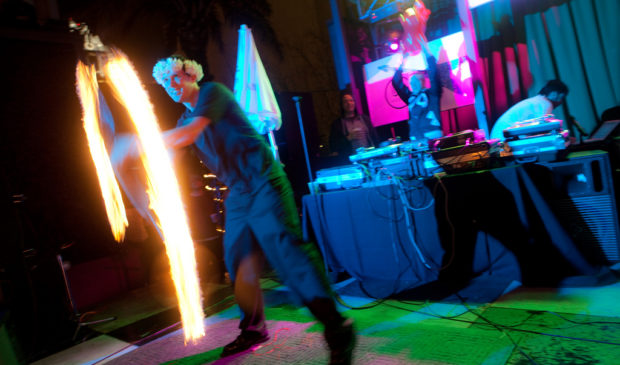Land trust and incentives for arts appear headed for Council
Thursday, January 25, 2018 by
Chad Swiatecki The creation of a land trust – a potential first for the city – is one of the tools City Council will consider next month in an attempt to keep artists and musicians from getting priced out of Austin. Council Member Ann Kitchen is completing language for the resolution that would include four components to provide some relief and additional revenue for local artists facing rent increases and a higher cost of living.
The resolution would direct city staff to gather information and identify the steps needed to create a land trust – most likely using property currently owned by the city – that would set aside property for use for performances, studios or other creative purposes by Austin artists or theater groups. It would also allow the city to apply economic incentives to mixed-use developments that include below-market rates for arts groups, identify changes to CodeNEXT that would incentivize locating arts facilities along population corridors, and create a microloan program to encourage residents to buy more local art.
Kitchen expects the resolution to be considered at the Feb. 15 Council meeting.
The possible moves are the latest in a series of hoped-for and in-process policies to improve the livelihood of Austin artists. In 2016, Council passed the Music and Creative Ecosystem Omnibus, which was aimed most directly at Austin’s music community, and portions of Mayor Steve Adler’s “downtown puzzle” policy platform are intended to direct portions of the city’s Hotel Occupancy Tax toward music and other cultural attractions.
Creating a land trust would be one of the more ambitious and decisive steps for the city, and would be something of an answer to the frustrations of city commissions and arts stakeholders who have had little luck in getting city staff to identify city-owned property that could be used to house theater and other groups being displaced.
“It’s an activity that takes some time to put in place, and it’s not a brand-new idea but it’s been more discussed now that we’re at risk of losing some of our cultural icons … that possibility has added urgency to the conversation,” Kitchen said. “The discussion has been around using city-owned land, and we’re going to look at what has been done in other areas, and what kind of staffing is needed to make this happen.”
Staff findings would likely be due in late spring, meaning any action would be unlikely to come in time for arts groups facing steep lease increases or expensive renovations to comply with building code, as is the case for the Pump Project Art Complex in East Austin.
The move to focus economic incentives on creative businesses and related developments fits with the current work being done by the Economic Development Department to reconfigure the city’s Chapter 380 agreements toward small businesses. Historically those agreements have only been used for attracting large companies with hundreds of jobs, but a revision plan, which would need to be approved by Council, is due this spring.
The land trust concept has been discussed at recent meetings of Austin’s Music Commission and Arts Commission – with more expected at a joint meeting of the two bodies on Monday. Arts proponents have said their conversations with local developers and businesspeople suggest there is a desire to find space for creative groups that are often cash-strapped. Incentives such as density bonuses, fee waivers and expedited planning approval have been championed by those looking for a way to keep arts groups and musicians in Austin.
“I’m pleased to see some movement happening because this is a hard nut to crack with all the property that is being lost by local groups,” said Lulu Flores, chair of the Arts Commission.
“We’ve been looking for any city resources that could be utilized to get some land that we could use as a solution to the space problem. If we can find (city) parcels, that’s great, but then we have to find people who believe in this, too. I’ve spoken with individuals who work with developers and can create partnerships … but it’s a matter of figuring out the how of making this happen.”
Brad Carlin, managing director of Austin’s Fusebox Festival and a member of two city working groups focused on arts and music preservation, said action is needed by the city to both identify space for creative uses and create some leeway in building code requirements that can place a financial burden on theater and other groups.
“The building code issues also get into CodeNEXT and the fact that much of the building code doesn’t match up with the needs and use of an arts organization,” he said. “On the developer side, there is a role the city can play, but the big moves have to come from the private business community because they can act faster and are able to get easier access to capital.”
Photo by kris krüg made available through a Creative Commons license.
The Austin Monitor’s work is made possible by donations from the community. Though our reporting covers donors from time to time, we are careful to keep business and editorial efforts separate while maintaining transparency. A complete list of donors is available here, and our code of ethics is explained here.
You're a community leader
And we’re honored you look to us for serious, in-depth news. You know a strong community needs local and dedicated watchdog reporting. We’re here for you and that won’t change. Now will you take the powerful next step and support our nonprofit news organization?










